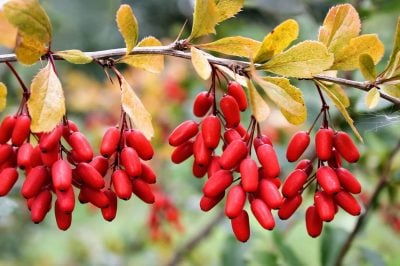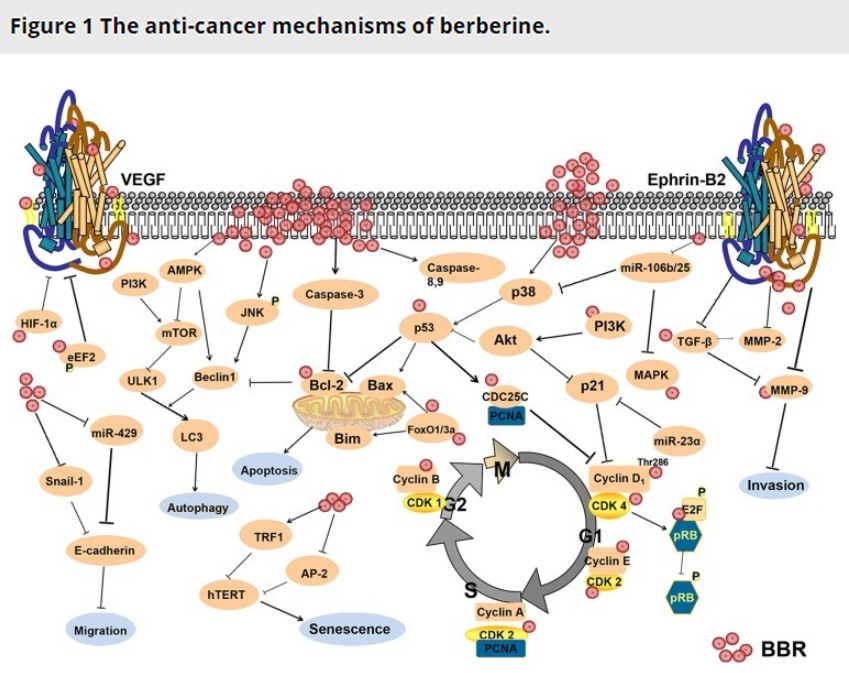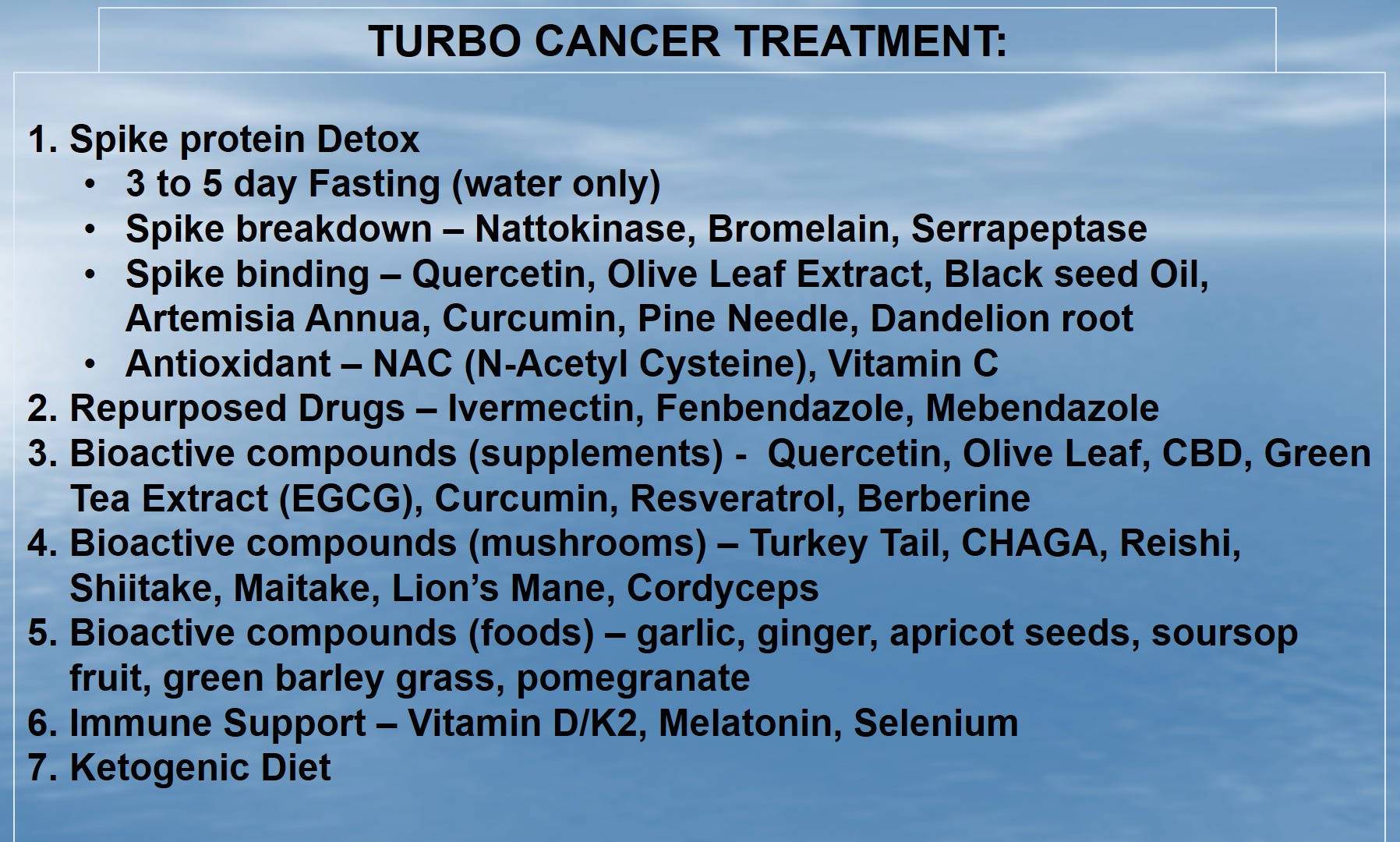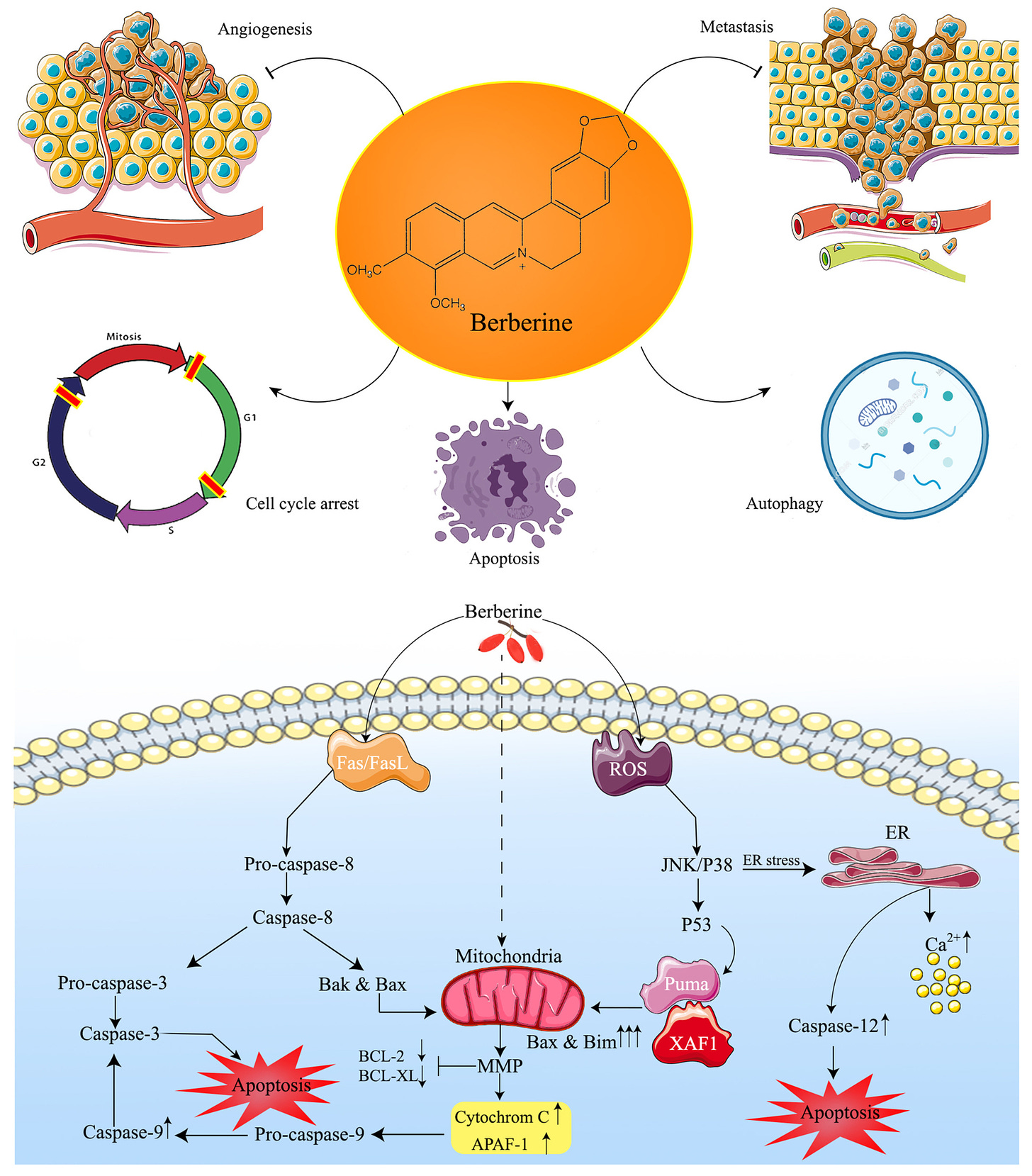Berberine and Cancer: New Promising Research on This Plant-Derived Alkaloid

All Global Research articles can be read in 51 languages by activating the Translate Website button below the author’s name (only available in desktop version).
To receive Global Research’s Daily Newsletter (selected articles), click here.
Click the share button above to email/forward this article to your friends and colleagues. Follow us on Instagram and Twitter and subscribe to our Telegram Channel. Feel free to repost and share widely Global Research articles.
Global Research Referral Drive: Our Readers Are Our Lifeline
***
Papers Reviewed:
-
(2021, Rauf et al) – Berberine as a Potential Anticancer Agent: A Comprehensive Review
- (2020, Wang et al) – The Anti-Cancer Mechanisms of Berberine: A Review
- (2020, Samadi et al) – Berberine: A novel therapeutic strategy for cancer
- Plants produce numerous distinct natural products—secondary metabolites—such as terpenoids, phenolics, and alkaloids
- alkaloids have remarkable biological and pharmacological properties such as antifungal, anti-inflammatory, antioxidant, anticancer, antihypercholesterolemic, antidiabetic, and antimicrobial
- berberine is an alkaloid derived from roots of various plants such as Berberis vulgaris, B. aristotle, B. aquifolium, Hydrastus canadensis, Pellodendron chenins, and Coptis rhizomes

- berberine is abundantly present in several species of barberry and goldenseal that are native to America and Asia
- berberine is a crystal yellow-colored isoquinoline alkaloid traditionally used in Chinese and Ayurvedic medicine.
-
Recently, scientists have reported that Berberine possesses broad-spectrum therapeutic potential due to its action against various ailments such as diabetes, hypertension, depression, obesity, inflammation, and cancer
-
Triple-negative breast cancer (TNBC) is an aggressive breast cancer subtype. Berberine was cytotoxic against all treated TNBC cell lines
- berberine induced cell cycle arrest and significant apoptosis, does not affect viability of normal breast cells.
- berberin reduces cell viability, reduces cell migration, decreases inflammatory cytokines
- berberin also reverses resistance to chemo (doxorubicin).
- berberin increases apoptosis of colorectal cancer cells
- berberin inhibits invasion and metastasis of CRC cells
- inhibits DNA synthesis and proliferation of pancreatic adenoca cells
- In vivo – reduces growth of tumors by 70% in mice
- berberine damages mitochondria of pancreatic cancer cells and dysregulates their energy metabolism processes
- berberine also blocks fatty acid biosynthesis, inhibits proliferation of pancratic cancer cells by regulating citrate metabolism.
- Matrix metalloproteinases (MMP) can cleave all extracellular matrix components and contribute to malignant cell invasion and metastasis. Gastric cancer has been linked to four matrix metalloproteinases
- berberine suppresses gastric cancer growth and migration by generating ROS (reactive oxygen species), decreases NF-κB and inhibits matrix metalloproteinases gene expression.
- berberine reduced cisplatin resistance of gastric cancer cells
- Berberine can cause cell cycle arrest in hepatocellular carcinoma cells
- berberine greatly improved expression of proapoptotic factors while downregulating anti-apoptotic factors.
- In vivo – berberine inhibited tumorigenicity and development of EBV positive nasopharyngeal carcinoma
- In vitro and in vivo administration of BBR to osteosarcoma cells reduces the expression of caspase-1 and Interleukin-1 (IL-1) in tumor cells and inhibits tumor cell development.
- In vivo – berberine decreases tumor growth in glioblastoma cells in vivo
- berberine reduces inflammation, induces apoptosis
- berberine decreased number of viable melanoma cells, suppressed migration and invasion of melanoma cells.
- In vivo – combined effect of berberine with doxorubicin treatment on murine melanoma caused a reduction in tumor weight (78%) and volume (85%)
- Berberine has been reported to be an effective natural alkaloid having antiendometrial cancer properties.
- According to in vitro and in vivo studies, berberine inhibited proliferation, migration, and invasion as well as metastasis in endometrial cancers
- berberine suppresses capacity of prostate cancer cells to spread and infiltrate in castration-resistant prostate cancer
- “Berberin’s direct cytotoxic impact is not considered very powerful…slow absorption, efflux from intestial cells and comprehensive metabolism by intestinal and hepatic cells render difficult its use in vivo.”
- Berberine regulates cell cycle and inhibits proliferation in multiple cancers (lung, colorectal, hepatoma, breast)
- in chondrosarcoma cells, berberine upregulated expression of p53 and p21 which resulted in cell cycle arrest
- Berberine regulates cancer cell apoptosis – shown in leukemia (ALL), hepatoma, colon cancer
- Berberine regulates cell autophagy – Autophagy is a form of programmed cell death
- effect shown in glioblastoma, breast cancer, hepatoma
- berberine also reverses drug resistance by regulating autophagy
- effects of berberine on autophagy are complicated as it can either inhibit or induce autophagy to exert anti-tumor effects
- Berberine Inhibits Cell Invasion and Metastasis – does this through multiple pathways, shown in breast cancer triple negative, melanoma,
- Berberine inhibits angiogenesis – by inhibiting the expression of VEGF
- Berberine Regulates Tumor Microenvironment (shown in osteosarcoma)
- Berberine has an effect on microRNAs
- More than 2500 microRNAs have been identified, and over-expression of many microRNAs has been shown to be closely related to onset and development of tumors
- berberine inhibits cancer invasion and metastasis by regulating the expression of microRNAs or interacting with them
- shown in colon cancer, endometrial cancer, multiple myeloma and hepatoma
- Berberine regulates telomerase activity – reverses tumor cell immortalization by inhibiting telomerase activity (normal cells have inhibited telomerase activity, abnormal activation of telomerase results in immortalization in tumor cells)
- Conclusion:
- “Although Berberine exerts beneficial effects that may aid in the treatment of tumors, the efficacy of Berberine is limited by poor solubility in water, rapid metabolism, and low absorption rate in intestines. Therefore, development of formulations that improve absorption of Berberine in the intestines may have great potential for treatment of cancer”
- “Berberine has been shown to inhibit cell proliferation and angiogenesis through modulating cell cycle, cell apoptosis, cell autophagy, and the tumor microenvironment. This review emphasized that Berberine as a potential anti-inflammation and antioxidant agent, also as an effective immunomodulator, is expected to achieve clinical application for cancer therapy.”

- According to the World Health Organization (WHO), herbal remedies have been continued to be the most common and primary health sources for more than half of the global population
- Current Chemotherapy derived from herbs:
- “There are four main structural categories of anticancer compounds being derived from herbs, namely vinca alkaloids (vincristine, vinblastine, vindesine, vinorelbine), epipodophyllotoxin lignans, taxane diterpenoids (paclitaxel, docetaxel), and camptothecin quinoline alkaloid derivatives.”
- Chinese medicine physicians began using CR to treat eye inflammation, diarrhea, and abdominal disorders in women
- In the 1800s, Berberine established as an herbal drug in North American traditional medicine and used to treat chronic inflammation such as gastric infections, respiratory disorders, and cancer, but eventually lost its value in Western folk medicine
- new studies have shown that BBR has antitumor effects such as antiproliferation, apoptosis, cell-cycle arrest, anti-invasion, inhibition of metastasis, and cytotoxicity
- significant proportion of the antitumor agents presently used in the clinical setting can naturally occur such as vincristine, vinblastine and paclitaxel
- There are several specific herbal products including alkaloids, flavonoids, lignans, saponins, terpenes, taxanes, which play major role in inhibiting proteins, enzymes, and cancer cell signaling pathways.
Berberine
- main sources of Berberine are rhizome, roots, and stem bark of Goldenseal (Hydrastis canadensis), Barberry (Berberis vulgaris), Coptis (Coptis chinensis), tree turmeric (Berberis aristata), and Oregon grape (Berberis aquifolium)
- Berberine has limited oral bioavailability in both humans and animals less than 5%, due to strong liver extraction, self-aggregation in the stomach and small intestine acidic environment, and first pass intestinal removal.
- Despite its low bioavailability, berberine has show great therapeutic efficacy in treatment of a number of diseases including cancer.
- berberine has anti-inflammatory effects and has been used as an effective therapeutic agent for Inflammatory bowel disease for years.
Berberine – Anti-cancer effects
- Berberine induces apoptosis through two main pathways, stimulating both intrinsic and extrinsic apoptosis pathways.
- Berberine can induce cell cycle arrest
- Berberine can both stimulate and inhibit autophagy
- Berberine inhibits autophagy and protects the kidney from destructive effects of cisplatin chemotherapy (nephroprotective)
- Berberine inhibits metastasis and invasion
-
Conclusion:
-
“Berberine (BBR), a natural isoquinoline alkaloid, is known as an outstanding biologically active natural product. It has efficient properties against different types of cancer. Reports have emphasized the great potential of BBR in inducing cancer cell death by stimulating both apoptosis and autophagy. Different studies reported that BBR could prevent the proliferation of cancer cells by inhibiting the molecules involved in cell cycle regulation and therefore, trigger cell cycle arrest in cancerous cells. In addition, many studies have examined the effect of BBR on the inhibition of metastasis and invasion of malignant cancer cells and reported this natural product to be efficient in the treatment of malignant and invasive cancers by inhibiting the expression of proteins involved in metastasis.”
-
My Take…
In building an alternative treatment approach to Cancer, it is important to look at a number of categories of potential treatments:

BERBERINE falls into the category of “Bioactive Compounds” – available as supplements.
I have written articles on a number of these:
Coming soon:
- Green Tea Extract (EGCG)
- Resveratrol
- Curcumin
*
Note to readers: Please click the share button above. Follow us on Instagram and Twitter and subscribe to our Telegram Channel. Feel free to repost and share widely Global Research articles.
Dr. William Makis is a Canadian physician with expertise in Radiology, Oncology and Immunology. Governor General’s Medal, University of Toronto Scholar. Author of 100+ peer-reviewed medical publications.
Featured image is from COVID Intel


